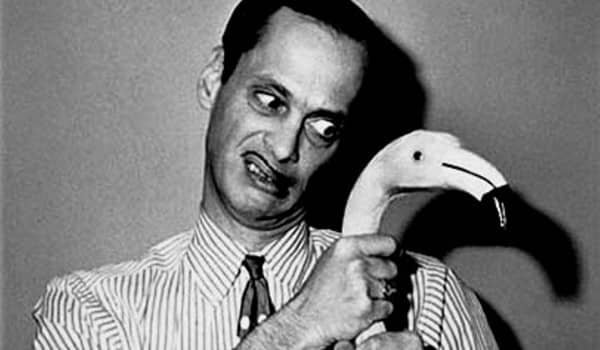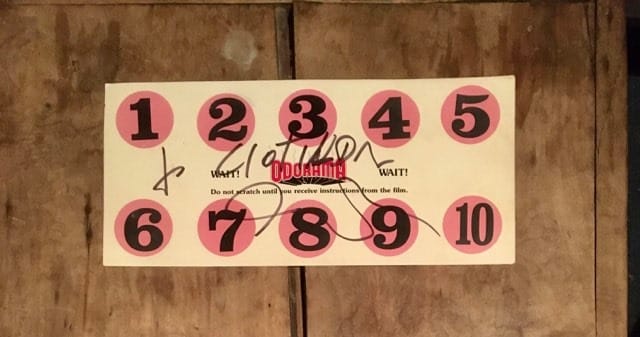Here are the notes I’ve taken during John Water’s masterclass at the Offscreen film festival. Enjoy!
[Résumé en français ici].

I. John Waters introduces himself
Puppet show
He began show business as a child, showing self-made puppets shows to the children of Baltimore. It was quite a success : at the end, he’d be earning 25 dollars for three shows a week (which was an huge amount of money at the time, especially for his age).
He did this trick, coming at the audience with a puppet dragon on his hand, biting every child in the audience : one third of it cried because they were afraid while the rest just loved it, he guesses it’s still pretty the same with his audience nowadays.

His first movies
“It was a Dogma film and I didn’t even realized.”
His influences : amongst other, the Theater of Ridiculous and underground movies (Kuchar brothers, Wahrol…)
Warhol isn’t really recognized as a great filmmaker yet, even though he has broken every rule and his movies are really beautiful.
It has been said that Waters is the only human being having seen 24 hours (“really cute people on speed talking”) in its integrality.
Waters’ first movies were shown in churches (at that time, they helped radical movies) and financed with his father’s money, that he has been able to give back to him. (Nor he neither her mother have seen Pink Flamingos, however.)

Tips for someone who wants to make a movie today
— Learn how to make it.
[On his first movies:] “I didn’t know how to make movies then ; some people think that I still don’t.”
— Figure out a way to make it so somebody would want to see them.
“Somebody’s got to like your movies.”
— “You got to think : « I’m going to make this » and figure out a way to do it.”
— The things are really changing fast, now ; you have to figure out a way to cope with that.
— “I’ve built a career on negative reviews.” But he thinks that today, it isn’t possible anymore : the critics are too hip. He thinks anyway that, finding a way to get a movie banned without putting neither violence nor sex in it, would be genius (but hasn’t found a way to do it yet).
“If you going to be shocking, you have to be clever.”

II. Questions & Answers
On writing a scenario
He comes with the title first : he doesn’t know why but it helps him.
Then he chooses the genre he will be playing with.
He then picks the names of his characters (in a baby book) and makes their biographies up. In that process, he does the location scout : it helps him when he imagines his characters living somewhere.
Then comes the plot. It is a very important part.
Keep in mind that, unless you are doing an experimental film, you got to tell a story.
He is quite old school when it comes to the plot : he thinks that comedy means brevity and that the story should have a beginning (where the character has something), a middle (the character loses it) and an end (the character learns something).
Once you’ve achieved your first draft, keep going, don’t read it ! Until you come to your third draft.
You have to have some commercial views while you’re writing, especially think about where it will be shown.
Watching movies without sound really helps learning a lot.
Pay for the music : the rights are really expensive, so you have to put it in your budget. (Or use one of your non-famous friends music band and make them sign a release.)
On production
The most important thing is that you get people to see your movie. So, you’ve got to get attention. Have an event for the launch of you movie : rent a theater, make funny things : if people want to come, the press will be there. (“I read the trade papers to figure how to do it.”)
It’s really important to find the places/audience that suit your work. How do you do that ? By participating and knowing about your business : you have to find the places where they put out the art you like, and get to know that kind of people. (For example, Pink Flamingos was shown all across the USA with a line of porn theaters.)
Once you’ll have your first reviews, make a book with it, so you’ll be able to show it to the press.
“If you make people laugh, you can win : you will at least make them listen.”
Don’t make every festival possible : you’ll lose a lot of audience.
Experience has taught him that if a movie doesn’t work during the first weekend, it won’t.
On actors
“You should do your movies with your friends at first.”
[A lot of actors] “are always talking about “the journey”. If they say “the journey”, I don’t hire them ! »

Crédit photo : Gautier Houba